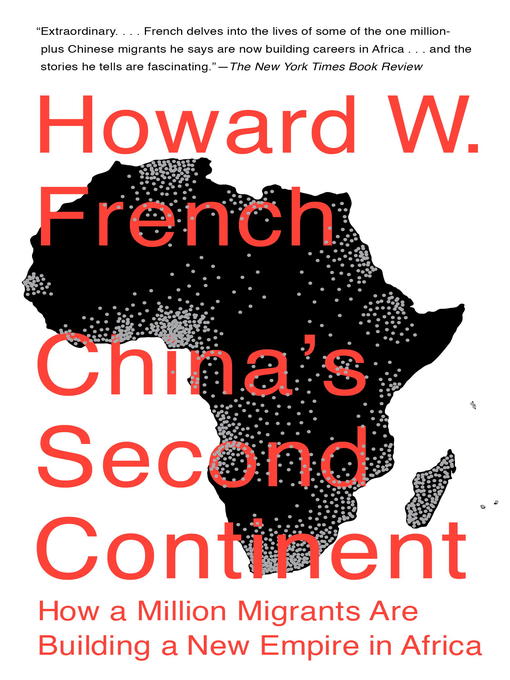
China's Second Continent
How a Million Migrants Are Building a New Empire in Africa
کتاب های مرتبط
- اطلاعات
- نقد و بررسی
- دیدگاه کاربران
نقد و بررسی

February 3, 2014
Since Jiang Zemin’s state visit to Africa in 1996 and his subsequent call to Chinese businesses to “go out” in search of opportunities abroad, China’s trade with Africa has grown dramatically, today surpassing its trade with either Europe or the U.S. But China’s investments, including massive building projects, are less significant for this rapidly evolving relationship, according to this 15-country survey by veteran African correspondent French (A Continent for the Taking), than the significant flow of new Chinese immigrants—often pushed out by the pressure and oppression back home as much as lured by opportunity. In vivid first-person reportage, French explores this momentous phenomenon, while challenging assumptions about China and Chinese immigrants. Lively interviews with Chinese entrepreneurs, African workers, politicians, and others reveal an already advanced socioeconomic and political landscape. Casual racism, strife between Chinese employers and native African workers, grassroots protests against Chinese inroads into markets, and political demagoguery exist side by side. Contrary to China’s official disclaimers, this relationship—based on acquisition of resources but also the securing of new markets for Chinese goods—bears a striking resemblance to Western colonialism. The book will appeal to students of China and Africa, and anyone interested in the shifting contours of the global economy and its geopolitical consequences.

April 15, 2014
Frank, straightforward reporting of a key, though largely ignored, element in African development, for better or ill. Former Washington Post and New York Times writer French (A Continent for the Taking: The Tragedy and Hope of Africa, 2005, etc.), who was based in Africa for years, clearly sympathizes with underdeveloped, poverty-entrenched, war-torn countries in Africa like Mozambique and Liberia, whose enormous resources, cheap labor and "fire sale" prices attract entrepreneurs from China's own burgeoning economy. Are these restless Chinese immigrants, to the tune of approximately 1 million since the 1990s, helping Africa catch up to the West, or are they contributing to a new colonial-minded economy of exploitation and despoilment? While French skirts the question in his introduction, his hard-hitting interviews with various Chinese farmers, shopkeepers and factory owners reveal these entrepreneurs as brutally single-minded in the pursuit of profit, mostly ignorant of African history and racist in their views of Africans. The Chinese immigrants have spilled over from their overburdened, overcompetitive homeland, and they are often little-educated businessmen resolved to take up then-head of state Jiang Zemin's challenge to "go out" in search of new opportunity. They have certainly found it in Africa, which contains 60 percent of the world's uncultivated land, huge stores of natural resources in minerals and forests, newly democratic regimes and a per capita gross domestic product that is less than half of that in Latin America. Moreover, governments eager for the Chinese revenue and aid in building infrastructure and universities often overlook corruption and abuses, such as labor safety and fair wages for Africans. With his language skills, especially in Chinese, French was able to infiltrate both the world of African workers and that of their new Chinese bosses. A unique and unsettling study of what many in the West do not want to see.
COPYRIGHT(2014) Kirkus Reviews, ALL RIGHTS RESERVED.

March 1, 2014
Former New York Times bureau chief in Africa and China, French (journalism, Columbia Univ.) has traveled extensively in sub-Saharan Africa. Spending time in 15 countries, he sought to understand China's ties to Africa through the experiences of Chinese migrants and long-term residents. French interviewed friends, other contacts, officials, and perfect strangers on such subjects as resource depletion, infrastructure building, rapid growth, cultural dependency, and rampant colonialism. He learned that in the spirit of noninterference, China pays little attention to things like local laws, democracy, and human rights. With candor, French shows the sometimes shocking racism of the Chinese toward Africans but also toward Chinese from different regions. China is emerging as a major player in the global economy, and Africa's future may well be determined by its relationship with China. The author makes it easy to see imperialistic attitudes common in development of the West being played out on the African stage. VERDICT For those who have an interest in China or in Africa or who just like to see history repeating itself. [See Prepub Alert, 11/18/13.]--Bonnie Tollefson, Cleveland Bradley Cty. P.L., TN
Copyright 2014 Library Journal, LLC Used with permission.

Starred review from March 1, 2014
Although several recent books have discussed, in variously alarmist fashion, China's recent incursions into Africa in pursuit of resources and profit, former New York Times journalist French (A Continent for the Taking, 2004) has the advantage of significant personal experience in both Africa and China. He also speaks Mandarin, so he can converse directly with some of the million or so members of the Chinese diaspora in Africa. They are a diverse lotdoctors, engineers, farmers, entrepreneurs, lobbyists, laborers, and prostitutes, among othersand accounts of their experience are often absent from analyses of Chinese-African relations, which typically focus on infrastructure building and resource grabbing. Interacting with Chinese and Africans in Mozambique, Sierra Leone, Namibia, and elsewhere, French capably illustrates that although the Chinese omnipresence in Africa may be a form of soft imperialism, it is also a result of the crushing pressureslack of space, merciless business competition, pollutionof modern Chinese society. For many Chinese, he suggests, Africa means opportunity and relative freedom that cannot be had at home. If French is sympathetic to the plight of many Chinese immigrants, however, he remains critical of their casual racism and general callousness about their African hosts. And as he laments the seeming inevitability of corruption and environmental degradation, French's disappointment in his cherished continent is palpable.(Reprinted with permission of Booklist, copyright 2014, American Library Association.)

























دیدگاه کاربران